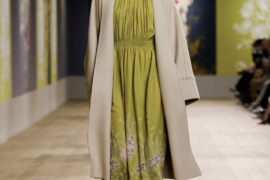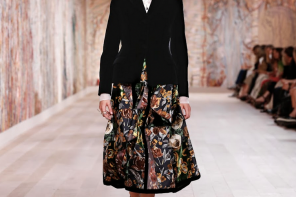Fatma Naser’s professional journey starts in the corporate world of IT solutions in Madrid and then shifts to the enchanting world of Middle Eastern cinema. Drawn to its liberating form of expression, Fatma’s bold leap to acting is mined with invaluable skills to overcome obstacles that heightened her determination on her unique path. She has starred in movies such as ‘Rouge’ alongside Amir Salah and co-starred in others such as ‘Femmes du Caire’ where she collaborated with Mona Zaki. Today, we chat with her about her inspiring journey in the
dynamic world of cinema and venture into the realm of production instigated by her time at home during the global pandemic.
What motivated your decision to leave a successful career in the corporate world of IT banking solutions to pursue a potentially risky career in acting?
I left my career in IT banking solutions for acting because of my passion for the glamorous world of cinema. Despite facing resistance and the absence of cinema schools in my hometown, I was determined to pursue my dream. Transitioning from the corporate world to cinema was a bold move, but it allowed me to express myself freely and equipped me with valuable skills for
collaboration and overcoming challenges.
Can you compare how structured academia is to the creative arts?
In business, there are strict rules and detailed plans, while in the arts, such as cinema and theater, there’s more freedom to be creative. This freedom allows artists to come up with new ideas, which can lead to surprising results. Even though they seem different, both areas require good communication and teamwork to achieve their goals. Whether it’s creating a business plan or staging a play, individuals from diverse backgrounds must collaborate to succeed.
Why did you move from Tunisia to Egypt for work in entertainment?
I moved to Egypt because I fell in love with the country during a vacation and decided to stay longer. I was fortunate to meet people in the film industry there, whereas Tunisia lacked resources for a thriving film scene at the time. Egypt offered more opportunities with its flourishing film industry, unlike Tunisia’s smaller-scale productions. Today, Tunisia’s cinema
scene is growing with increased productions and films.
Could you tell us about the important things you’ve achieved in your career that have helped make you the actress you are today?
My acting journey began with a movie called ‘The Advertisement’ by Amr Salama. Since then, I’ve been involved in numerous significant projects. One of them was ‘Femmes du Caire,’ directed by Youssri Nasrallah, where I collaborated with Mona Zaki. Another noteworthy milestone was ‘On Air,’ a light comedy showcased at the Cairo Film Festival and directed by Hab Lamee. I played a leading role in ‘Rouge,’ a romantic drama alongside Amir Salah. Additionally, I’ve worked on television series such as ‘Maktoub’ and appeared in the successful soap opera ‘Black Crows’ in Lebanon, portraying the wife of a terrorist leader. I’ve worked on projects in various countries such as Iran, Lebanon, and Morocco. One significant project was a Moroccan film called ‘Jalaeddine,’ directed by Hassan Ben Jalloun. In this movie, I portrayed a character named ‘Iba,’ a dying mother searching for spiritual fulfillment. The film explored themes of love, hope, and redemption.
Throughout my career, I’ve taken on diverse roles including those of a victim, impoverished individual, submissive person, authority figure, fighter, and femme fatale. Each role has provided valuable lessons and contributed to my personal and professional growth by allowing me to immerse myself in different cultures. These experiences have played a pivotal role in shaping my career trajectory.
I’ve heard that you’ve started production work as well as acting. Could you tell me more about it?
During the Covid pandemic, I unexpectedly found myself in Tunisia for two years without a job or projects because I chose to decline roles that didn’t offer something new. Instead, I’ve prioritized roles that fulfill me and allow me to excel, rather than simply appearing on screen. However, an opportunity emerged to co-produce the second season of a successful series called ‘Nouba.’ This experience ignited my journey into producing. While I gained valuable television experience, it wasn’t exactly what I had envisioned, prompting me to establish my own production company.
I’ve heard through the grapevine that you’ve recently produced your debut film?
Yes, that’s correct. As a woman who has launched a production company, I am truly proud of my first movie, ‘Balzar.’ I collaborated with Kays Mejri, the talented director behind ‘Barzakh.’ I always had faith in his skills. Our movie revolves around a prophecy centered on women, which adds to my pride. It’s an 80-minute film that seamlessly blends horror, surrealism, and drama, offering the audience an unforgettable experience. The story unfolds in a small village and delves into an ancient prophecy concerning women. ‘Balzar’ creatively and profoundly explores supernatural themes and psychological breakdowns. This film marks Kays’ directorial debut. Despite facing challenges in securing opportunities from traditional producers, I recognized his potential through his experimental short films and chose to assist him in realizing his vision. I am thrilled to embark on this journey, pushing boundaries, and igniting inspiration among audiences worldwide.
Text by Suna Ahmed.




